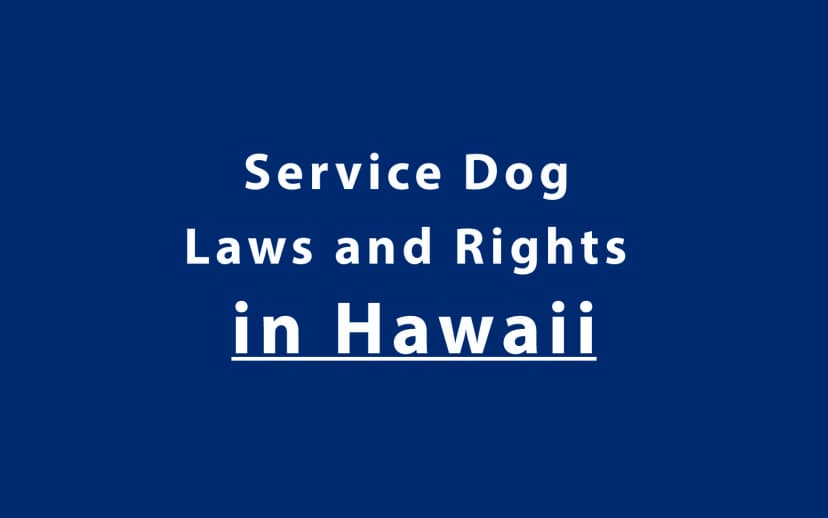Service Dog Laws and Rights in Michigan
Service dogs are indispensable companions for individuals with disabilities, providing essential assistance that enables greater independence and participation in daily activities. In Michigan, as in other states, specific laws and regulations govern the use of service dogs, ensuring the rights of handlers are protected while maintaining public safety and accessibility. This comprehensive guide explores the definitions, rights, responsibilities, and legal considerations associated with service dogs in Michigan.
Introduction to Service Dog Rights in Michigan
Understanding the legal framework surrounding service dogs is crucial for handlers, businesses, landlords, and the general public. Both federal and and Michigan state laws provide protections and set guidelines to ensure that individuals with disabilities who rely on service dogs can access public spaces, housing, and employment without discrimination. Key legislations include:
- Americans with Disabilities Act (ADA): A federal law prohibiting discrimination against individuals with disabilities in all areas of public life.
- Michigan Penal Code (Excerpt) Act 328 of 1931, Section 750.502c: State legislation that aligns with the ADA, offering additional protections within Michigan.
- Fair Housing Act (FHA): Ensures individuals with disabilities have equal access to housing, including accommodations for service and assistance animals.
- Air Carrier Access Act (ACAA): Regulates the rights of individuals with disabilities when traveling by air with service animals.
Definition of a Service Dog in Michigan
Under the ADA, a service animal is defined as a dog that is individually trained to perform tasks or do work for a person with a disability. These tasks must be directly related to the individual’s disability. Michigan law mirrors this definition, ensuring consistency between state and federal regulations. It’s important to distinguish between:
- Service Dogs: Trained to perform specific tasks for individuals with disabilities.
- Emotional Support Animals (ESAs): Provide comfort by their presence but are not trained to perform specific tasks related to a disability.
- Therapy Animals: Trained to provide psychological or physiological therapy to individuals other than their handlers, often in institutional settings.
While service dogs have broad public access rights, ESAs and therapy animals do not enjoy the same legal protections in public accommodations.
Public Access Rights in Michigan
Both the ADA and Michigan law grant individuals with disabilities the right to be accompanied by their service dogs in all public accommodations. This includes, but is not limited to:
- Restaurants
- Hotels
- Retail stores
- Government buildings
- Hospitals
Handlers are responsible for ensuring their service dogs are under control at all times, typically using a leash, harness, or tether. If these devices interfere with the dog’s work or the handler’s disability prevents their use, alternative methods such as voice or signal controls must be employed. Businesses and staff may only ask two specific questions when the need for the service dog is not apparent:
- Is the dog a service animal required because of a disability?
- What work or task has the dog been trained to perform?
They cannot request documentation, require the dog to demonstrate its task, or inquire about the nature of the handler’s disability. However, a service dog can be asked to leave if it is out of control and the handler does not take effective action to control it, or if the dog is not housebroken.
Housing Rights for Service Dog Handlers
Under the FHA, individuals with disabilities are entitled to reasonable accommodations in housing, which includes the right to have service or assistance animals, even in properties with no-pet policies. Michigan’s laws align with these federal protections. Landlords and housing providers cannot charge pet fees for service or assistance animals but may request documentation if the disability or the need for the animal is not obvious. This documentation typically comes from a healthcare provider affirming the individual’s disability and the necessity of the animal for their well-being.
Employment Rights in Michigan
Title I of the ADA requires employers to provide reasonable accommodations to employees with disabilities, which can include allowing a service dog in the workplace. Employers may request documentation to substantiate the need for the service dog but must engage in an interactive process to determine appropriate accommodations. Accommodations can only be denied if they pose an undue hardship on the operation of the business.
Air Travel and Transportation Laws
The ACAA ensures that individuals with disabilities can travel with their service dogs on commercial airlines. Airlines may require documentation and prior notice, especially for long flights. Service dogs must be accommodated in the cabin without additional fees.
For other modes of public transportation, such as buses, trains, and taxis, the ADA mandates that service dogs be allowed to accompany their handlers. Transportation providers cannot deny access or charge additional fees for service dogs.
Service Dog Training and Certification in Michigan
Michigan does not require service dogs to be certified or registered. Handlers have the option to train the dog themselves or seek professional assistance. The key requirement is that the dog is trained to perform specific tasks related to the handler’s disability. While not legally required, some handlers choose to use identification cards, vests, or harnesses to signify their dog’s status as a service animal, which can help in public interactions.
Penalties for Misrepresenting a Service Dog in Michigan
Misrepresenting a pet as a service animal undermines the integrity of legitimate service animals and can lead to legal consequences in Michigan. State law explicitly prohibits falsely claiming that an individual possesses a service animal or a service animal in training in any public place.
Violating this law is considered a misdemeanor and may result in:
- Imprisonment: Up to 90 days.
- Fines: Up to $500.
- Community Service: Up to 30 days.
These penalties aim to deter individuals from fraudulent representations that can erode public trust and potentially jeopardize the safety and acceptance of genuine service animals and their handlers.
It’s essential for individuals to understand that service animals are specifically trained to perform tasks directly related to a person’s disability. Misrepresenting an untrained pet as a service animal not only disrespects the challenges faced by individuals with disabilities but also violates Michigan law, leading to significant legal repercussions.
Public Awareness and Advocacy in Michigan
Michigan has made considerable progress in raising public awareness about service dog rights and responsibilities. However, ongoing education and advocacy efforts are essential to ensuring equal access and respect for service dog teams across the state.
a. Public Education and Outreach
Organizations such as Leader Dogs for the Blind and Paws With A Cause, both based in Michigan, offer extensive programs to educate the public about the role of service dogs and the rights of their handlers. These organizations also provide resources for schools, businesses, and government offices to foster more inclusive environments.
Efforts include:
- Educational seminars and community events
- School programs that teach children how to interact appropriately with service dogs
- Public service announcements and informational brochures
- Online campaigns to dispel myths and clarify service dog etiquette
By promoting understanding, these efforts help reduce discrimination and create a safer, more welcoming environment for service dog handlers.
b. Encouraging Responsible Ownership
Alongside rights, service dog handlers in Michigan must uphold their responsibilities. Proper care, ongoing training, and appropriate behavior in public spaces are essential to maintaining access rights under state and federal law.
Handlers are expected to:
- Keep their service dog under control at all times
- Ensure the dog is clean, healthy, and vaccinated
- Maintain a high standard of behavior and training
- Use appropriate gear (leash, harness, or other control tools)
Public confidence in service dogs depends heavily on the visible behavior of the teams. Well-behaved dogs and knowledgeable handlers contribute significantly to the legitimacy and acceptance of service animals across the state.
How to Register a Service Dog in Michigan (Voluntary)
While Michigan does not require official certification or registration for service dogs, many handlers opt for voluntary registration and identification for convenience and peace of mind. A registration package can help reduce intrusive questioning and streamline access when traveling or entering public spaces.
AssistanceDogPartners.org offers:
- Digital and physical ID cards with both the handler’s and service dog’s photo
- Official registration certificate (digital and/or mailed)
- Instant document access for easy travel or proof of status
- Optional gear such as vests and harnesses for clear public identification
These tools can be helpful in real-world scenarios, especially when interacting with landlords, airport staff, or business owners unfamiliar with ADA or Michigan law.
Note: Registration is not legally required and does not confer any additional legal rights. However, it often serves as a practical tool for education and advocacy.
Conclusion: Ensuring Service Dog Rights in Michigan
Michigan’s service dog laws, grounded in both state and federal legislation, aim to protect individuals with disabilities and ensure they can live, work, and travel with independence and dignity. From public access and housing protections to employment accommodations and air travel, Michigan aligns closely with national standards while enforcing local rules that promote fairness and discourage abuse.
Whether you’re a service dog handler, business owner, or curious citizen, understanding these rights helps create a more inclusive and respectful community. Education, advocacy, and proper training are the keys to supporting service dog teams and upholding their essential role in our society.
External Resources:



